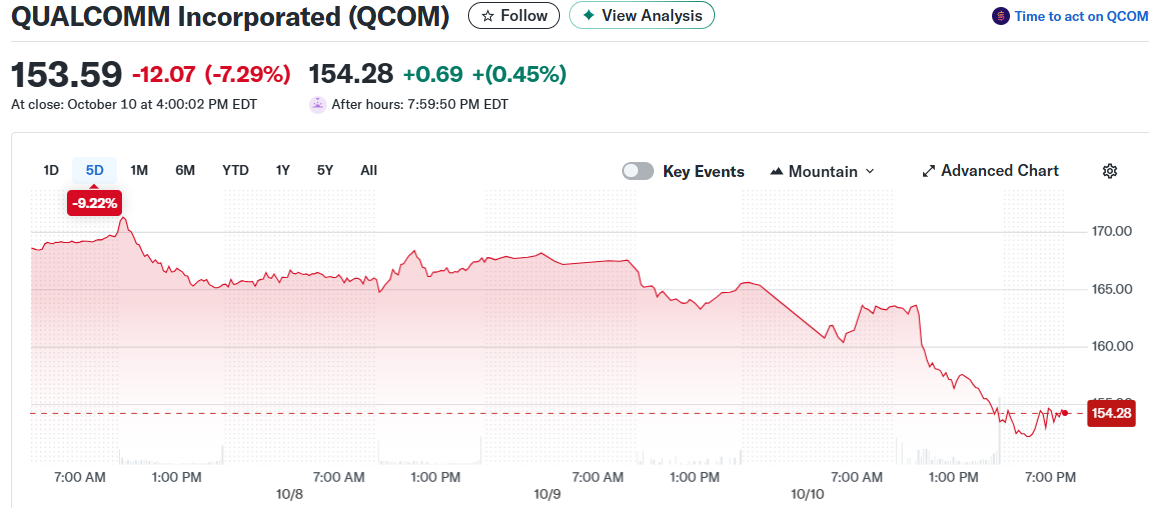TLDR
- Qualcomm shares fell 4% on Friday after China’s State Administration of Market Regulation announced an antitrust investigation into the company’s Autotalks acquisition
- China claims Qualcomm violated anti-monopoly law with its purchase of Israeli firm Autotalks, which closed in June 2025
- The investigation comes ahead of a planned meeting between President Trump and President Xi at the APEC summit in South Korea during the last week of October
- Qualcomm supplies smartphone chips to major Chinese manufacturers including Xiaomi
- China has ramped up regulatory pressure on US tech companies, previously targeting Nvidia in September over its Mellanox acquisition
Qualcomm stock dropped 4% on Friday after Chinese regulators opened an antitrust investigation into the chipmaker. China’s State Administration of Market Regulation announced it would probe Qualcomm’s acquisition of Israeli firm Autotalks.

The regulator suspects Qualcomm violated China’s anti-monopoly law with the deal. The acquisition closed in June 2025, more than two years after it was first announced.
Autotalks specializes in vehicle-to-everything communication technology. The company develops chips that allow cars to communicate with other vehicles and infrastructure.
China’s State Administration for Market Regulation has opened an antitrust investigation of Qualcomm’s acquisition of Autotalks https://t.co/8ENNZK0vKY
— Bloomberg (@business) October 10, 2025
Qualcomm said it is fully cooperating with the investigation. The company stated it remains committed to supporting its customers and partners in China.
The chipmaker supplies smartphone processors to major Chinese manufacturers. Xiaomi is among Qualcomm’s biggest customers in the country.
US Tech Companies in Chinese Crosshairs
This isn’t the first time Chinese regulators have targeted American tech firms. In September, authorities alleged Nvidia violated anti-monopoly law with its Mellanox acquisition.
Beijing has reportedly discouraged local companies from purchasing Nvidia chips. The regulatory actions come as tensions between the US and China escalate.
China announced new port fees on US ships starting October 14. This matches the date when Washington plans to impose charges on large Chinese vessels.
Beijing also expanded rare earth export controls this week. The new rules now cover 12 of 17 metallic rare earth elements.
China halted purchases of US soybeans. The move targets American farming communities ahead of trade negotiations.
The Trump administration proposed barring Chinese airlines from flying over Russia on US routes. Washington also expanded sanctions preventing Huawei from accessing restricted American goods.
Trade Talks Loom
President Trump and President Xi are expected to meet at the APEC summit in South Korea. The meeting will take place during the last week of October in Gyeongju.
A tariff truce that saw US levies reach 145% expires on November 10. Both countries are positioning themselves before negotiations begin.
Treasury Secretary Scott Bessent and Commerce Secretary Howard Lutnick are handling the trade issues. Trump said they would work on the details.
Despite tensions, Beijing has signaled willingness to negotiate. Premier Li Qiang said the economies “can and should become friends and partners” during UN meetings last month.
China reportedly floated $1 trillion in potential investments. This exceeds commitments from the European Union, Japan and South Korea combined.
Trump said he might restrict product sales to China. “We import from China massive amounts,” Trump stated. “Maybe we’ll have to stop doing that.”
Julian Evans-Pritchard from Capital Economics called China’s approach risky. He said it complicates talks with the US even if successful.
Citigroup economists noted both countries are strengthening their positions ahead of trade talks. They suggested the fragile tariff truce could continue beyond the November deadline.







